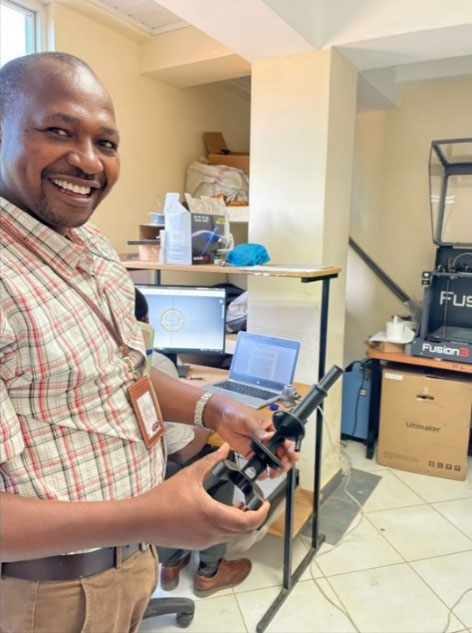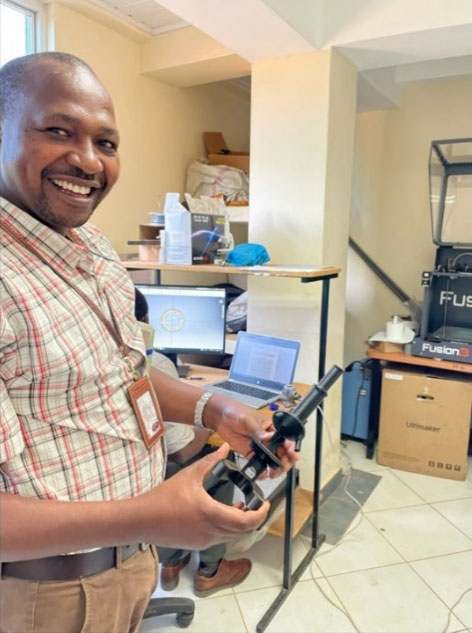We bring you the voices of JICA returnee students from Jomo Kenyatta University of Agriculture and Technology (JKUAT) in Kenya!
Interview with Dr. James Mutuku Mutua, JICA returnee: On his current work at JKUAT after studying abroad with JICA
Name:James Mutuku Mutua
Country of Origin:Kenya
Destination of study in Japan (name of University): Tottori University
Course: Material Science Engineering
Duration of your study: 3 years (March 2015-March 2018)
Present position: Lecturer

1. What have you been doing after completing your studies in Japan?
I teach units related to material science and engineering. Also, I do lectures for Masters and PhD students and I’m involved in curriculum development for short courses in additive manufacturing and other engineering related courses.
2. Reflecting back on your study experience in Japan, what was different from studying in Kenya? What was the benefit of studying in Japan, or why did you want to study in Japan?
Studying in Japan was my dream. From even when I finished my high school, I saw the advert of going to study in Japan for Bachelors and Masters which I applied but at then I was not lucky. I wanted to be in a country which is passionate about research. Later this was realized when I got a training opportunity under the JICA Long term special programs through the AFRICA-ai-JAPAN Project (JICA).
The typical culture of Japanese researchers is not driven by push or from outside, but they are from within. So, with that kind of passion, I wanted to learn from those who know how to do research.
I try my level best to share the knowledge that I learned and try to cultivate that culture of research with my students and also with my colleagues.
3. What are some of the Japanese development experiences, techniques that you learned during your study in Japan, which relates to your country’s socio-economic development? How have you been utilizing them during your study? How would you like to contribute to your country’s development?
I believe and concur with the Japanese that small is better. We have to start small and continue to improve on the small things that we have.
Even when starting the laboratory-based research in JKUAT, the questions I received from others were ‘How are you going to get the machine?’, ‘How are you going to secure the space when I do not have an office?’, ‘Where are you going to get the money to buy those machines?’ etc. But I believed that when I start with a computer, maybe in two years I expect to have a 3D printer here. It’s the dream that never died. So, I just said, small is better even if it takes me many years, but I aspired to have this laboratory-based research. The continuous improvement of the small things that you have is what makes it now. And I believe that is what I’ve tried to implement here.
I continuously inject those resources in the same place and the small thing is seen to be growing big. Being able to develop by continuously improving what you have is one of the development experiences that I learned. All the work in the laboratory is all the techniques that I learned in Japan.
4. Have you faced or facing any challenges/difficulties in utilizing some of your knowledge and expertise obtained during your study in Japan back in Kenya?
If yes, how did you overcome those difficulties? Was your network with JICA scholar alumni or your Japanese professors useful?
The additive manufacturing knowledge is new. The main limitation is the facilities, I overcame such difficulties by being able to source for some material, some equipment with the support from the JICA Project (AFRICA-ai-JAPAN Project). Some of the key facilities like the 3D printers and scanners were purchased with JICA’s support which are very instrumental in additive manufacturing.
The network with my professors at Tottori University has been really useful. I always seek advice from Prof. Chen who was my supervisor. For example, when I wanted to have the Residual Stress measuring machine, we sought opinion from my professor whether it is a good machine, whether I have had an opportunity to use the machine or whether I could perform exemplary experiments from recycled materials using the machine. The response from the Professor was very positive, so the team here went ahead and bought the machine in Fig.2. Through the hard work that I posed during my study, I was able to establish a good relationship with my professors.

Fig 1. Dr. James Mutua shows his output

Fig. 2 Dr. James Mutua and his assistant in his laboratory, posing with the newly acquired Residual stress measuring machine.




scroll